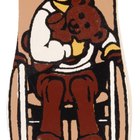
Though it is difficult to say what effect the absence of any one man’s father had on him beyond what he tells you and what could be assumed by his current behaviors, studies do show that boys who were raised without fathers are at greater risk for academic-career failure and social maladjustment than those who are raised in two parent households. However, these findings are based on the assumption that children raised in two-parent households are more likely to receive the financial support, guidance, love and acceptance that would be expected in a traditional family, which is not always the case. Regardless of who meets these needs,children raised having their needs met are far better off than those who are raised in homes where one or more of these basic needs went unmet.
Financial Support
Money provides not only the basic needs of food, shelter and clothing, but also offers children opportunities and exposure to better quality social interaction not available to economically disadvantaged youth. When accounting for other factors, such as parental behavior, poverty accounts for up to 50 percent of children's academic, social and behavioral problems. In 2012, more than 38 percent of families living in single-mother homes lived below the poverty line. That compared to less than 18 percent of families living with single dads and less than 9 percent of two-parent households. Adults raised in poverty get less schooling, achieve lower incomes and are far more likely to be poor themselves than individuals raised in non-poor homes.
Guidance and Supervision

Most people believe that boys need male role models, and yet in 2012, a little over 27 percent of all family households with children under age 18 are single-mother households, up from 25 percent in 2007. While studies support the logical conclusion that children, particularly boys, from single-parent households are more likely to exhibit delinquent behavior due to a lack of supervision than do children of dual-parent households, there is some evidence that children of single-father households are actually more at risk for both a lack of supervision and delinquent behavior than are children of single-mother households. It is estimated that approximately 40 percent of juvenile delinquents continue to commit crimes into adulthood.
Love and Acceptance
Regardless of racial, cultural, linguistic, geographic, and other such variations, parental acceptance has consistently been associated with psychological adjustment, whereas rejection tends to be associated with difficulties in maintaining future relationships, depression, and substance abuse. Furthermore, a father's love has been shown to be as important in normal development as the mother's. Single parents without social and emotional supports themselves -- especially if the parents are young and economically deprived -- appear universally to be at greatest risk for withdrawing love and affection from their children. 21 percent of adults' psychological wellbeing is accounted for by both paternal and maternal acceptance or rejection. Men who were rejected as children sometimes become adults who are fiercely independent to the point of excluding their partners, or overly dependent, seeking frequent reassurances that they are loved.
Loving a Man With an Absent Father
While having grown up without a father may increase the risk of social, emotional and financial difficulties that follow boys into adulthood, most boys eventually learn to cope and grow into well-adjusted men. It has also been shown that it is better to have been raised in a safe home where father wasn't present than to be in a home where conflict and antisocial behavior was an everyday norm. While no one can change what happened to them as children, men who had absent fathers can learn to cope by putting their rejection into context, realizing their own potential, and depersonalizing the events as being a result of their parents' failings and not their own. For women loving these men, a supportive relationship negates many earlier effects.
Related Articles

The Effect on Men That Grow Up Without ...

What Are the Benefits of Father Figures ...

Importance of the Brother Sister Bond

Effects on Girls Raised by Single ...

A Brother's Influence on a Younger ...

The Effect of Divorced Parents on a ...

What is the Typical American Family?

The Definition of Non-Cognitive Skills

How Does an Overbearing Mother Affect a ...

What Were the Traditional Gender Roles ...

The Emotional Effects on the Father ...

The Importance of Teenage Friendships

How Poor Relationships Affect the Family

Mother-Child Bonding vs. Father-Child ...

Importance of Family Structure in ...

Problems With Teen Marriage

How Much Are Monthly Disability ...

What Experiences Make Men Emotionally ...

The Disadvantages of Physical ...

Types of Mother-Daughter Relationships
References
Resources
Writer Bio
Based just outside of Harrisburg, Pa., Catherine Donges teaches adjudicated adolescents in a residential treatment facility in York, Pa. Donges earned both her Master of Arts and a Master of Fine Arts in creative writing from Wilkes University and a Master of Science in education from Capella University and has written both a women's fiction and a young adult novel.
Photo Credits
John Howard/Digital Vision/Getty Images